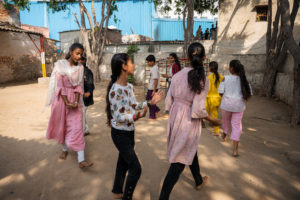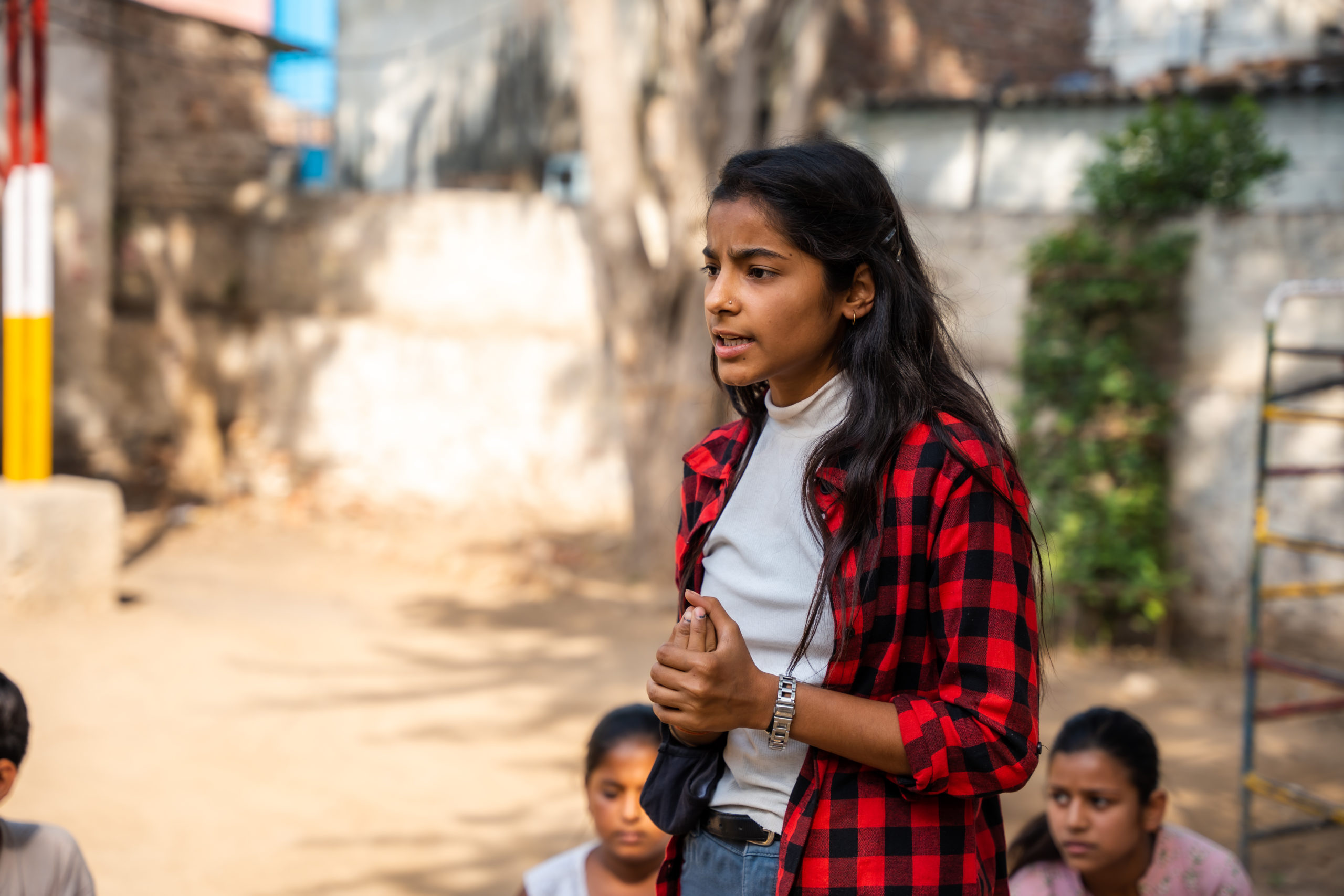Teenagers gather in a circle as they start their street performance, turning a dusty courtyard in Faridabad, India, into their stage.
Meena*, 15, pretends to be a nosy neighbour, forever gossiping about young girls and their morals.
“They wear jeans and they talk about maths. Who will want to marry these girls who go to school,” she says, acting the part of the lady and giving a wicked grin to her fellow neighbours.
Another teenager playing a government officer approaches the gossiping neighbours and asks if they have any daughters who can be enrolled in school. He tells them education is free and that it’s the only way to ensure their children can be independent in the face of any calamity life throws at them.
The women whisper among themselves and don’t look convinced. The play ends with a song about how sending girls to school is the only way to ensure they can live happy and fulfilled lives. The song also encourages people to not listen to idle gossip.
Meena, who wrote the script, says it was inspired by her own experiences.
When she and her sister started school, the women in her neighbourhood would gossip about them wearing school uniforms and make fun of their mother, telling her how difficult it would be for her daughters to marry.
“The area where I live is very backwards, even if a girl wears jeans instead of the traditional salwar kurta, or talks to a boy, the whole neighbourhood spreads rumours about the girl. Most girls my age want to escape from this neighbourhood because of how people think,” says Meena.
Defying stereotypes and activating change
In a slum community where gender norms are deeply entrenched, Meena defied stereotypes and emerged as a confident, articulate young woman with a purpose. She enrolled in the Children’s Parliament and Street Theatre programme, a platform provided by SOS Children’s Village Greenfields, India.
Through this initiative, Meena and other young people from the community find their voices and address issues facing their neighbourhood, such as child labour, alcoholism, and illiteracy.
“I learned how to speak to others respectfully and present my point of view, without feeling shy or conscious,” she says.
“When all the children came together and discussed issues around our neighbourhood, we felt we could change the things we didn’t like about our locality. Everything seemed easier when we did it together, as a community.”
In Meena’s family, she’s now seen as a confident member who goes out and solves problems and is able to engage with the outside world. This is unusual for a teenage girl in the community where she lives.
Empowering children
The Children’s Parliament, or Bal Panchayats, are children’s committees and councils created to build children’s leadership skills. These collectives work like a local council, getting together regularly and discussing concerns brought to it about school, community, and their own families.
Children, aged 8 to 18, are mobilised to form groups and activities, like street theatre, to inspire their creative minds. These activities enable them to open up and share concerns.
 “With zero props and costumes, street theatre is a great way to foster creativity in young people. It gives them a medium to express their angst but also propose solutions,” says Monica, a facilitator at SOS Children’s Villages in India who’s been working with Children’s Parliaments and street theatre groups for more than a decade.
“With zero props and costumes, street theatre is a great way to foster creativity in young people. It gives them a medium to express their angst but also propose solutions,” says Monica, a facilitator at SOS Children’s Villages in India who’s been working with Children’s Parliaments and street theatre groups for more than a decade.
Meena explains, “When we perform, sometimes what we’re advocating doesn’t resonate with the crowd. Even so, in every performance, the message will resonate with at least two or three people, and each time we repeat the message the community starts understanding it better.”
Through the SOS Children’s Villages Family Strengthening Programme, more than 35,000 children and young people have been reached throughout India, where they’ve been enrolled as members of Child Parliaments and street theatre groups.
“Across India, Child Parliaments have made children and adolescents advocates in their own communities,” says Monica.
“Some of the most pressing issues we’ve worked on across our programmes are issues children themselves feel strongly about. We see girls’ education, domestic violence, and alcoholism repeatedly addressed by children across India.”
“The Child Parliaments are one of the few places where we also see the value of the Sustainable Development Goals of making children and adolescents agents of change. There are many changes that are easier accomplished when youth are at the forefront,” she adds.

